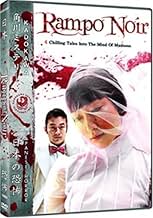ÉVALUATION IMDb
6,2/10
1,2 k
MA NOTE
Ajouter une intrigue dans votre langueThis four-part anthology takes its cue from the short fiction of legendary horror writer Edogawa Rampo.This four-part anthology takes its cue from the short fiction of legendary horror writer Edogawa Rampo.This four-part anthology takes its cue from the short fiction of legendary horror writer Edogawa Rampo.
- Prix
- 1 victoire au total
Ryûhei Matsuda
- Tarô Hirai (story "Imomushi")
- (as Ryuuhei Matsuda)
Histoire
Le saviez-vous
- ConnexionsFeatured in WatchMojo: Top 10 Fantastic Asian Movies You Have Not Seen (2018)
- Bandes originalesAir du miroir 'Dis-moi que je suis belle' from 'Thais'
Written by Jules Massenet and Louis Gallet
Performed by Usuki Ai and Motosugi Mio
Commentaire en vedette
I also happened to have seen this at the very same Japanese festival in Sydney, and I enjoyed it quite a lot.
These shorts are sick. The writer behind the original stories may have a disturbed and twisted mind for inspiring these disgusting tales of torture and obsession, and love (love which is so alien it doesn't really fit the word).
Of course many stories by Edogawa Rampo have been banned already in Japan for that very same reason.
However, these shorts were great examples of how dark cinema can get. These push right to the boundaries, where sense, reason, and any sort of real point is left behind in its own madness. And it does try to make points. They draw parallels between conscious and subconscious, reality and delusion. The surreal images and narratives destroy the boundaries between the two and the flow freely into each other. The film challenges what art really is. Whether it's a beautiful reflection, a horrific image, or something that is both beautiful on the outside but dead and corroded inside. Here we see that mirrors have the potential to be god, trapping us in its frame. Love is horrific. Horrific. These shorts have the potential to repel you in disgust, or to draw you in and lose yourself in its insanity, and for that reason alone it is a powerful work of art.
The four individual directors obviously had a daunting task ahead of them trying to make this. They had to present these tales honestly, and also visually uncover the madness behind them. I don't know about the former, as I haven't read any of Rampo's stories, however visually these films are amazing too. Especially Mirror Hell, which has amazing shots of the actors constantly reflected in dozens of different mirrors.
You leave the film feeling as if the makers had thrown a lot of violence and sex at you stylishly but with no real substance. The shorts are too surreal and disjointed to follow through with any of the points they try to make. The are no answers to be found in these shorts, and nothing profound to learn or re-learn. However, these shorts were never made with such intentions. They were made to show the madness of Edogawa Rampo. They were made to disgust you, and to provoke you. And they mastered that exceptionally.
Whether you like it or not, you won't forget this one.
These shorts are sick. The writer behind the original stories may have a disturbed and twisted mind for inspiring these disgusting tales of torture and obsession, and love (love which is so alien it doesn't really fit the word).
Of course many stories by Edogawa Rampo have been banned already in Japan for that very same reason.
However, these shorts were great examples of how dark cinema can get. These push right to the boundaries, where sense, reason, and any sort of real point is left behind in its own madness. And it does try to make points. They draw parallels between conscious and subconscious, reality and delusion. The surreal images and narratives destroy the boundaries between the two and the flow freely into each other. The film challenges what art really is. Whether it's a beautiful reflection, a horrific image, or something that is both beautiful on the outside but dead and corroded inside. Here we see that mirrors have the potential to be god, trapping us in its frame. Love is horrific. Horrific. These shorts have the potential to repel you in disgust, or to draw you in and lose yourself in its insanity, and for that reason alone it is a powerful work of art.
The four individual directors obviously had a daunting task ahead of them trying to make this. They had to present these tales honestly, and also visually uncover the madness behind them. I don't know about the former, as I haven't read any of Rampo's stories, however visually these films are amazing too. Especially Mirror Hell, which has amazing shots of the actors constantly reflected in dozens of different mirrors.
You leave the film feeling as if the makers had thrown a lot of violence and sex at you stylishly but with no real substance. The shorts are too surreal and disjointed to follow through with any of the points they try to make. The are no answers to be found in these shorts, and nothing profound to learn or re-learn. However, these shorts were never made with such intentions. They were made to show the madness of Edogawa Rampo. They were made to disgust you, and to provoke you. And they mastered that exceptionally.
Whether you like it or not, you won't forget this one.
- olz_15
- 1 déc. 2005
- Lien permanent
Meilleurs choix
Connectez-vous pour évaluer et surveiller les recommandations personnalisées
- How long is Rampo Noir?Propulsé par Alexa
Détails
Box-office
- Brut – à l'échelle mondiale
- 217 $ US
Contribuer à cette page
Suggérer une modification ou ajouter du contenu manquant

Lacune principale
By what name was Ranpo jigoku (2005) officially released in Canada in English?
Répondre
























